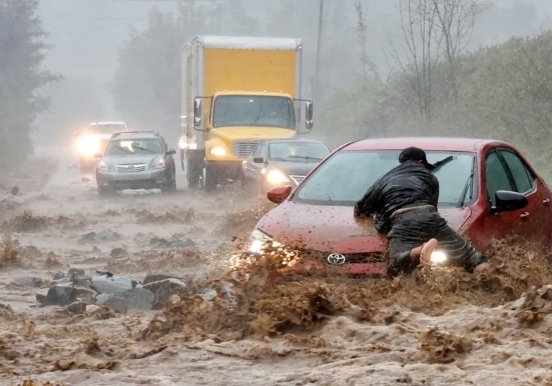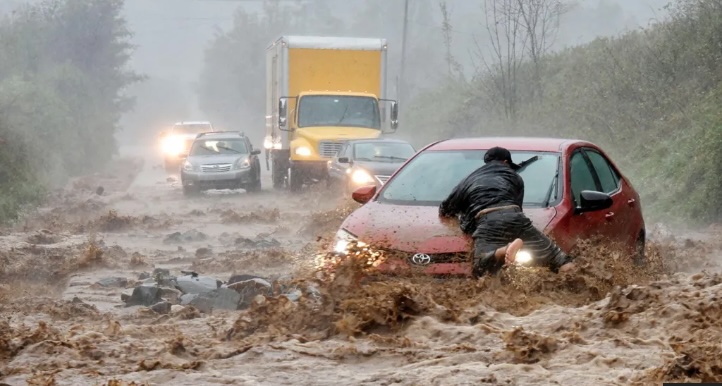Climate, Health and Equity Brief
Helene in context, Project 2025, and Gen Z displacement
October 4, 2024

The Climate, Health & Equity Brief is GMMB’s take on the latest news on the current impacts of climate change. If you haven’t subscribed yet, you can do so by clicking here.
Hot Topic: Devastation. We have all seen the images of the destruction left in the wake of Hurricane Helene, which unleashed more than 40 trillion gallons of rain across the Southeast. At least 215 people are confirmed dead from the storm’s immediate impacts—a number that is certain to grow as hope fades for finding survivors—and some estimates put the economic impact as high as $250 billion.
And the storm taught a larger lesson: no place is safe from the worst impacts of the climate crisis. Asheville, North Carolina—long considered a “climate haven”—was devastated, even though the lush mountain town is more than 2,000 feet above sea level and 300 miles from the nearest coastline.
And a new study suggests that mortality from U.S. hurricanes far exceeds the immediate death toll. Researchers from UC Berkeley and Stanford studying all major storms that affected the U.S. from 1930 to 2015 found that the average storm indirectly leads to 7,000 to 11,000 excess deaths over 15 years, far exceeding the average of 24 immediate deaths officially reported. They attribute the follow-on deaths to a range of factors, from environmental changes and economic disruption to changes in social support networks and the impacts of long-term stress.
Despite the clear and present danger to Americans, Project 2025, the conservative blueprint for a second Trump administration, proposes weakening the federal government’s response to disasters: dismantling the National Weather Service, terminating disaster-preparation grants, and reducing, or even stopping, aid for smaller disasters. The plan also calls for phasing out federal flood insurance managed through FEMA, which serves as a lifeline for millions of Americans as the climate crisis intensifies.
Against this backdrop, a recent poll found that more than one-third of Generation Z worries they’ll need to move due to the climate crisis. And these fears are not unfounded. Data from the UN show a 41% increase in weather-related displacement from 2008 to 2022 worldwide, as island nations sink into the sea, Middle Eastern countries inch toward uninhabitability, indigenous Alaskans are forced to relocate due to melting permafrost, and wildfires and hurricanes wipe out entire towns and local economies in the U.S. and abroad.
With the election just weeks away, we urge our U.S. readers to use your most important tools—your voices and your votes—to ensure that we elect a president who will continue to fight climate change rather than deny its very existence.
Human Health
Hurricane Helene has taken at least 130 lives across six states, with catastrophic-level devastation of roads, bridges, and towns, large-scale floods, and communities struggling to get clean water. (CNN, Vox)
A new study published in Nature finds that hurricanes and tropical storms in the U.S. contribute to far more deaths than previously recorded, with an estimated 7,000 to 11,000 excess deaths over 15 years following each storm, disproportionately affecting Black populations and those living states less frequently hit by storms. (Xinhua)
A new study found the number of Americans who will die from extreme heat exposure will triple by mid-century to roughly 26,000 deaths annually, with poor, minority and elderly Americans most affected as they have limited access to air conditioning, increased exposure to air pollution, and higher susceptibility to heat-related illnesses. (Medical Xpress)
Planetary Health
Previously touted as a climate haven due to its high elevation and distance from the coast, Asheville, North Carolina’s devastating one-in-500 chance flood from Hurricane Helene suggests that no region is entirely safe from climate-fueled natural disasters. (POLITICO, Fast Company)
With the global population expected to rise by as many as 1.7 billion and global energy demand projected to increase by 75% in the next 25 years, rising fossil fuel use, record oil and gas production, political conflicts, and inadequate financial support are threatening the fight against climate change despite earlier optimism about reducing emissions. (The New York Times)
In what is considered the world’s largest deforestation project, five million acres of forest, wetlands, and grasslands in Indonesia will be cleared to make way for a cluster of giant sugarcane plantations, raising concerns about environmental destruction, increased emissions, and the displacement of Indigenous communities. (Mongabay)
A recent study revealed that the number of days with simultaneous extreme heat, dryness, and fire risk has tripled in parts of South America since 1970, posing significant threats to ecosystems, human health, and vulnerable rural and Indigenous communities. (Phys.org)
Equity
Temperatures in Kuwait exceeded 122°F in May this year—the earliest point in decades— and experts warn that large parts of the country could become unsuitable for human habitation within the next 50-75 years if current trends continue. (South China Morning Post)
Indigenous Alaskans from Newtok will be the first Alaska native villagers forced to relocate after erosion and melting permafrost have destroyed nearby land. (AP News)
Rising sea levels threaten to submerge the Pacific island nation of Tuvalu by 2050, prompting its leaders to seek international recognition of permanent maritime boundaries and statehood—even after the land disappears—to preserve its economic rights and cultural identity. (Reuters)
Politics & Economy
Project 2025, the conservative roadmap for a Republican presidency, proposes weakening disaster preparation, response and recovery, including dissolving federal flood insurance, terminating disaster-preparation grants, reducing aid after smaller disasters, and dismantling the National Weather Service. (E&E News)
A new Gallup poll revealed that one-third of Gen Z fears they may need to relocate due to climate change, with 88% holding policymakers accountable for water and environmental issues and 73% concerned about water-related concerns such as pollution, flooding, drought, and lack of access to clean drinking water. (ABC News)
Researchers examining the hidden environmental costs of food found that beef prices would surge from $5.34 to $27.36 per pound if the impact of cattle on deforestation, water use, and greenhouse gas emissions were factored in—an additional $22.02 per pound in environmental costs. (The New York Times)
A new report reveals that America’s small banks face significant, unrecognized financial risks from climate-related disasters—threatening $2.4 billion across nearly 200 institutions—as extreme weather events increasingly damage properties tied to their loan portfolios. (Fortune)
The Bloomberg Agriculture Spot Index—which tracks the prices of coffee, corn, cotton, cocoa, sugar, soybean products, and wheat—showed a monthly increase of 7% in September as farms around the globe struggled with drought, heavy rains and wildfires, with threats to crops that could eventually flow through to higher grocery bills. (Bloomberg)
Driven by bipartisan support, tech industry investments, and subsidies in recent climate laws, the Department of Energy is noting a nuclear energy “resurgence” to help manage soaring energy demand from new factories, EVs, hotter summers, and data centers, with demand for the latter predicted to increase 200% by 2030. (Axios)
Developers have proposed two new luxury waterfront condominiums on Texas’ rapidly sinking Galveston Island, while the U.S. Army Corps of Engineers prepares for a two-decade, $57 billion project—the largest in the Corps’ history—to raise the island’s sea wall and build a barrier of levees and flood walls. (The Washington Post)
Action
Agrivoltaics—the practice of sharing of energy and food production on the same plot of land—has taken off in rural farming communities, with farmers being paid to support renewable energy while promoting their farming efforts through practices such as solar grazing. (The Washington Post)
The Biden-Harris administration is executing as many IRA-allocated clean energy investments as possible before the November election to ensure a new administration cannot hold up the funds. (POLITICO)
Barcelona’s innovative subway system is using regenerative braking to power trains, station amenities, and neighborhood EV chargers, with the potential to provide 41% of the energy needed for trains and save 3,885 metric tons of CO2 emissions annually once fully implemented. (Grist)
Amazon and several other companies have agreed to purchase $180 million in carbon offset credits from Brazil’s Para state to support forest conservation and emission reductions in the Amazon rainforest. (Reuters)
Life as We Know It
Researchers are monitoring air and surface temperatures at playgrounds in Arizona to understand how hot the equipment gets and how shade from trees and engineered designs can keep playgrounds safe in the face of rising temperatures. (Inside Climate News)
Short corn crops are being tested across 30,000 acres in the Midwest as the smaller and sturdier crop base can withstand 50 mph winds and potentially use less water—changes that will likely prove necessary in the face of a heating climate. (AP News)
Kicker
To learn more about what you can do as an individual to help the climate crisis, check out “What If We Get It Right?“—a book with an optimistic view on meeting climate goals. (PBS)
The losses that these communities are seeing are going to be generational losses.”
– Former FEMA director Brock Long on the devastation of Hurricane Helene
The GMMB Climate, Health & Equity Brief would not be possible without the contributions of the larger GMMB team—Aaron Benavides, Stefana Hendronetto, Nikki Melamed, Sharde Olabanji and Marci Welford. Feedback on the Brief is welcome and encouraged and should be sent to CHandEBrief@gmmb.com.

)





